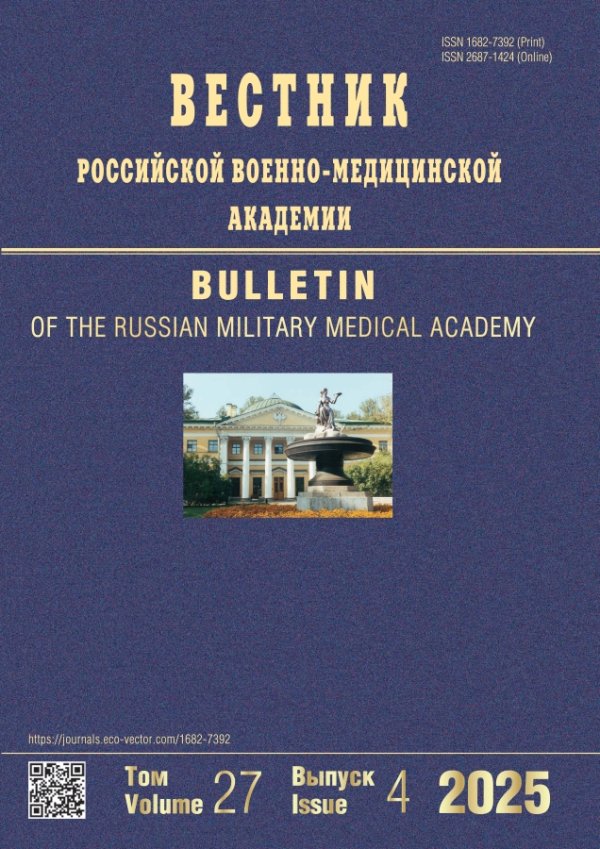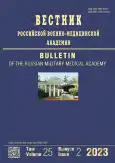Features of the immunophenotype of cancer stem cells in different stages of colorectal cancer
- Authors: Maistrenko N.A.1, Chirsky V.S.1, Erokhina A.A.1, Sazonov A.A.1
-
Affiliations:
- Kirov Military Medical Academy
- Issue: Vol 25, No 2 (2023)
- Pages: 229-238
- Section: Original Study Article
- URL: https://journals.rcsi.science/1682-7392/article/view/134103
- DOI: https://doi.org/10.17816/brmma321384
- ID: 134103
Cite item
Abstract
This study examines the immunophenotype characteristics of the stem cell population in colon adenocarcinoma at various stages of the disease and evaluates their impact on the prevalence of the oncological process. The research involved analyzing surgical specimens from 67 patients with histologically confirmed colon adenocarcinoma using microscopic and immunohistochemical techniques. The patients were divided into two groups based on the extent of the neoplastic process. The first group consisted of 32 patients with localized colorectal cancer (T3–4aN0M0), while the second group included 35 patients with colorectal cancer with synchronous monoorgan liver metastases (T3–4aN0–2M1a (hep)).The study assessed the immunophenotype of the tumor and investigated its correlation with the disease stage. The analysis revealed no significant correlation between the proliferative activity index of the immunohistochemical marker Ki67 and the stage of the disease (p = 0.108). However, when comparing the immunophenotype of stem tumor cells in the group of patients with metastatic colorectal cancer, statistically significantly higher levels of expression were observed for the following immunohistochemical markers: ALDH1+ (p = 0.028), ALDH1+Ki67+ (p = 0.0002), and CXCR4+ (p = 0.005). These results indicate a strong association between immunohistochemical markers characterizing the stem cell population and the prevalence of the tumor. Therefore, markers such as ALDH1+, ALDH1+Ki67+, and CXCR4+ can provide valuable insights into the molecular and biological properties of stem tumor cells, aiding in the clinical assessment of the potential aggressiveness of colon adenocarcinoma. The study also found that the median stem cell proliferation index, which considers the proportion of proliferating cells only within the stem cell population and not the entire cell pool, in the group of patients with localized colorectal cancer was 16%. Notably, none of the patients in stage II of the disease had a stem cell proliferation level below 50%, and the stem cell proliferation index ranged from 0% to 50%. Notably, none of the patients in stage II of the disease had a stem cell proliferation level below 50%, and the stem cell proliferation index varied from 0% to 50%. In contrast, the median index of stem cell proliferation in the group of patients with metastatic colorectal cancer was 45.5%, with values ranging from 7% to 100%. The stem cell proliferation index in this group was significantly higher (p = 0.00001) than that in the group with localized tumor processes. Considering the small population of stem tumor cells, determining the index of stem cell proliferation is advisable for a more accurate assessment of their proliferative activity.
Full Text
##article.viewOnOriginalSite##About the authors
Nikolay A. Maistrenko
Kirov Military Medical Academy
Email: nik.m.47@mail.ru
ORCID iD: 0000-0002-1405-7660
SPIN-code: 2571-9603
MD, Dr. Sci. (Med.), professor
Russian Federation, Saint PetersburgVadim S. Chirsky
Kirov Military Medical Academy
Email: v_chirsky@mail.ru
ORCID iD: 0000-0003-3215-3901
SPIN-code: 7295-3369
MD, Dr. Sci. (Med.), professor
Russian Federation, Saint PetersburgAlina A. Erokhina
Kirov Military Medical Academy
Author for correspondence.
Email: lokitrikster@yandex.ru
ORCID iD: 0000-0001-7343-5089
SPIN-code: 1768-8760
pathologist
Russian Federation, Saint PetersburgAleksey A. Sazonov
Kirov Military Medical Academy
Email: sazonov_alex_doc@mail.ru
ORCID iD: 0000-0003-4726-7557
SPIN-code: 4042-7710
MD, Dr. Sci. (Med.)
Russian Federation, Saint PetersburgReferences
- Hyuna S, Ferlay J, Siegel R, et al. Global cancer statistics 2020: GLOBOCAN estimates of Incidence and Mortality Worldwide for 36 cancers in 185 countries. CA: A Cancer J Clin. 2021;71(3):209–249. doi: 10.3322/caac.21660
- Erokhina AA, Chirsky VS, Maistrenko NA, et al. Proliferative activity of cancer stem cells in the prognosis of hematogenous metastasis of colon adenocarcinoma. Genes and Cells. 2022;17(2):40–46. (In Russ.). doi: 10.23868/202209006
- Raskin GA. Kliniko-morfologicheskaya otsenka prognosticheskikh i prediktivnykh faktorov pri adenokartsinome tolstoi kishki [dissertation]. Saint Petersburg; 2014. 246 p. (In Russ.)
- Maistrenko NA, Chirsky VS, Sazonov AA, Erokhina AA. Comprehensive approach to choosing surgical tactics for locally advanced forms of colorectal cancer in patients of older age groups. Grekov's Bulletin of Surgery. 2019;178(2):38–45. (In Russ.). doi: 10.24884/0042-4625-2019-178-2-38-45
- Kaprin AD, Starinskii VV, Petrova GV. Zlokachestvennye novoobrazovaniya v Rossii v 2018 godu (zabolevaemost' i smertnost'). Moscow: MNIOI im. P.A. Gertsena; filial FGBU «NMITS radiologiI» Minzdrava Rossii; 2019. 15 p. (In Russ.).
- Maistrenko NA, Manikhas GM, Sazonov AA, et al. Influence of the age factor and tumor immunophenotype on the effectiveness of cytoreductive operations in metastatic colorectal cancer. Problems in oncology. 2019;65(6):855–862. (In Russ.).
- Munro MJ, Wickremesekera SK, Peng L, et al. Cancer stem cells in colorectal cancer: a review. J Clin Pathol. 2018;71(2):110–116. doi: 10.1136/jclinpath-2017-204739
- Fanali C, Lucchetti D, Farina M, et al. Cancer stem cells in colorectal cancer from pathogenesis to therapy: controversies and perspectives. World J Gastroenterol. 2014;20(4):923–942. doi: 10.3748/wjg.v20.i4.923
- Walcher L, Kistenmacher A-K, Suo H, et al. Cancer stem cells-origins and biomarkers: perspectives for targeted personalized therapies. Front Immunol. 2020;11:1280. doi: 10.3389/fimmu.2020.01280
- Nefedova NA, Mal'kov PG. Role of stem cells in large bowel carcinogenesis. Pelvic Surgery and Oncology. 2015;5(3):15–24. (In Russ.). doi: 10.17650/2220-3478-2015-5-3-15-24
- Moskalev AV, Gumilevskiy BYu, Apchel AV, Tsygan VN. Stem cells and their physiological effects. Bulletin of the Russian Military Medical Academy. 2019;(4):172–180. (In Russ.).
- Ershov VA. Morfogenez tservikal'noi neoplazii, assotsiirovannoi s virusami papillomy cheloveka vysokogo kantserogennogo riska [dissertation]. Saint Petersburg; 2020. 342 p. (In Russ.).
- Rezaee M, Gheytanchi E, Madjd Z, Mehrazma M. Clinicopathological significance of tumor stem cell markers ALDH1 and CD133 in colorectal carcinoma. Iran J Pathol. 2021;16(1):40–50. doi: 10.30699/ijp.2020.127441.2389
- Holah NS, Aiad HA, Asaad NY, et al. Evaluation of the role of ALDH1 as cancer stem cell marker in colorectal carcinoma: an immunohistochemical study. J Clin Diagn Res. 2017;11(1):17–23.
- Mohammed SY, Kaf RM, Ahmed MM, et al. The prognostic value of cancer stem cell markers (Notch1, ALDH1, and CD44) in primary colorectal carcinoma. J Gastrointest Cancer. 2019;50(4):824–837. doi: 10.1007/s12029-018-0156-6
- Ginestier C, Hur MH, Charafe-Jauffret E, et al. ALDH1 is a marker of normal and malignant human mammary stem cells and a predictor of poor clinical outcome. Cell Stem Cell. 2007;1(5):555–567. doi: 10.1016/j.stem.2007.08.014
- Filina AB. Rol' faktorov vrozhdennogo immuniteta v protsesse opukholeobrazovaniya [dissertation]. Moscow; 2019. 108 p. (In Russ.).
- Khare T, Bissonnette M, Khare S. CXCL12-CXCR4/CXCR7 Axis in colorectal cancer: therapeutic target in preclinical and clinical studies. Int J Mol Sci. 2021;22(14):147371. doi: 10.3390/ijms22147371
- Goïta AA, Guenot D. Colorectal Cancer: The contribution of CXCL12 and its receptors CXCR4 and CXCR7. Cancers (Basel). 2022;14(7):1810. doi: 10.3390/cancers14071810
- Ivanova AK. Optimizatsiya taktiki ad"yuvantnoi khimioterapii u bol'nykh rakom obodochnoi kishki s uchetom kliniko-morfologicheskikh kharakteristik [dissertation abstract]. Saint Petersburg, 2022. 23 p. (In Russ.).
- Fedyanin M, Popova A, Polyanskaya E, Tjulandin S. Role of stem cells in colorectal cancer progression and prognostic and predictive characteristics of stem cell markers in colorectal cancer. Curr Stem Cell Res Ther. 2017;12(1):19–30. doi: 10.2174/1574888X11666160905092938
- Andrade F, Rafael D, Vilar-Hernández M, et al. Polymeric micelles targeted against CD44v6 receptor increase niclosamide efficacy against colorectal cancer stem cells and reduce circulating tumor cells in vivo. J Control Release. 2021;331:198–212. doi: 10.1016/j.jconrel.2021.01.022
Supplementary files
















